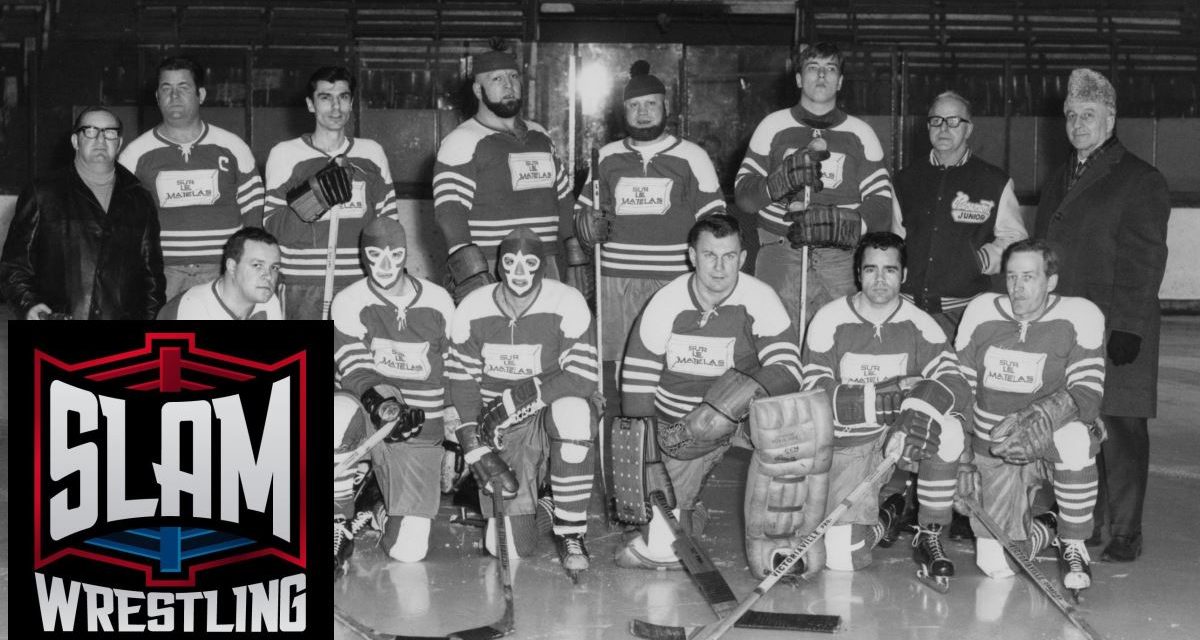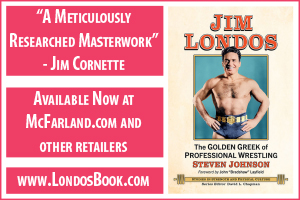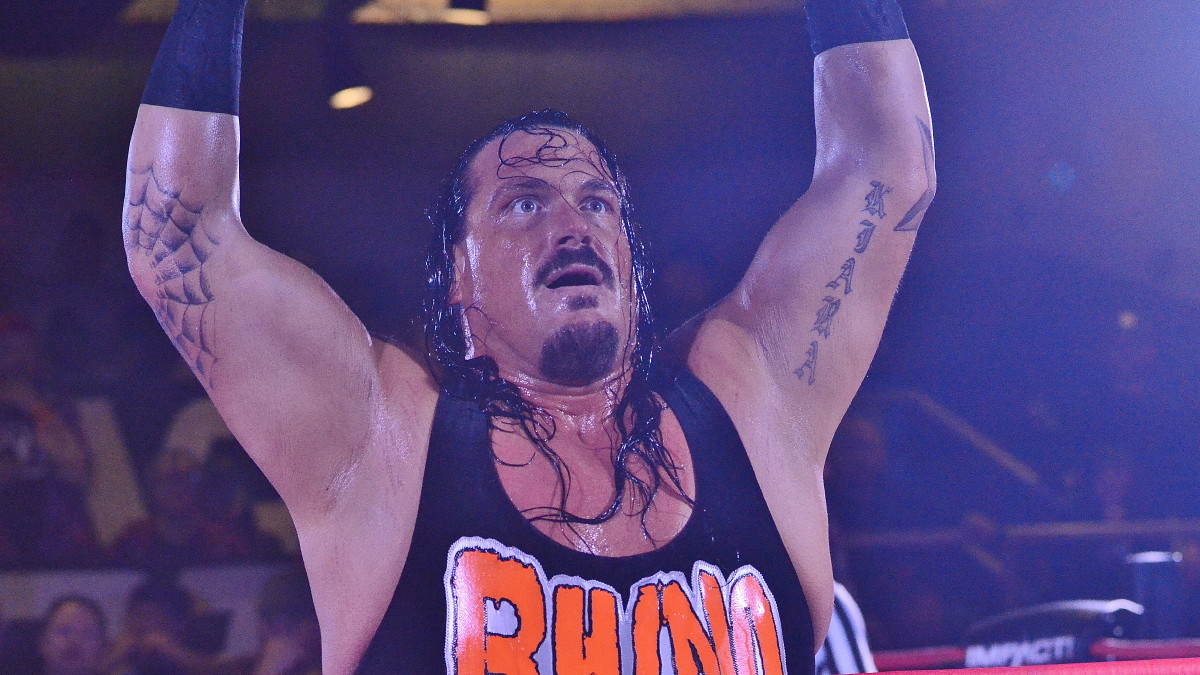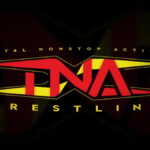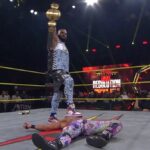Lionel Conacher was voted Canada’s athlete of the half-century in 1950 and most biographies mention his participation in the world of pro wrestling but with little info. It’s time to remedy that. In simplest terms, by the time Conacher tried pro wrestling in 1932, he was already a formidable and well known multi-sport star.
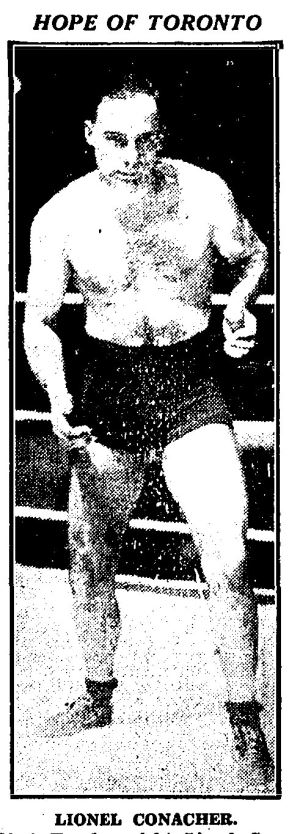
Lionel Conacher as a pro wrestler.
Conacher was a current NHL player, had previously played pro football for the Toronto Argonauts, and had excelled in other sports. He was already known as Canada’s greatest athlete. While pro wrestling would turn out to be a short pursuit, it was still a notable chapter in his amazing career.
In 1931, the Toronto-born Conacher was a member of the NHL Montreal Maroons and their off-shoot lacrosse team in the summer months, but still had strong ties in Toronto. He and fellow NHLer New York Americans star Billy Burch opened Burch and Conacher’s Men’s Clothes Shop at 233 Yonge Street in Toronto in April of that year.
On a visit later that summer with the Lacrosse Maroons, there was a Lionel Conacher night at Arena Gardens/Mutual St. Arena to pay tribute to his accomplishments. George S. Henry, who was the Premier of Ontario, awarded a silver tea set to Conacher as part of a ceremony before the game.
In August 1931, it was announced that after a year of consideration, Conacher might be ready to enter the professional wrestling field. If it came to fruition it would be with the group controlled by Paul Bowser of Boston. Toronto promoter Ivan Mickailoff had been running cards at the Arena Gardens since 1929 and was associated with Bowser, using his World champ Henri DeGlane and others. It was surmised that if Conacher excelled as he had in other sports that he would eventually be sent against Gus Sonnenberg and other ex-football stars that specialized in the flying tackle.
Reports played up his amateur feats, an Ontario wrestling championship as a teen presumably. There were many Athletic Clubs in Toronto at that time with many tournaments and meets going on all over the city. When he retired in 1937 one report added the Canadian heavyweight boxing title, but stats and results are hard to come by for these claims.
It was noted that there was a lot of money to be made in wrestling, more than the other sports. Salaries in those days were much lower than today’s big money sports. One report said Conacher had made $7,000 when with the Pittsburgh Yellow Jackets in 1923 and 1924. That was the league maximum for a number of years.
By 1931, Conacher was in his seventh year of a 12-year NHL career. He was said to be on the downside after having taken over as player-coach of the New York Americans and then moving to Montreal to play with the Maroons for the 1930-31 season. In February 1931, he was called out of shape by the team and was placed on waivers to the shock of many. The other teams passed on his contract but at the same time an injury to another player got him back into play where he excelled.
Others agreed on the move to wrestling citing the boxing match he had with Jack Dempsey where some claimed Conacher (then with the football Argos) was better than the champ on that day. They did fight but it was a two-round exhibition for the entertainment of convalescing soldiers at the Christie Street Military Hospital. While Conacher was said to have “acquitted himself creditably, none present thought he constituted a menace to Dempsey’s reputation.” The bout on October 10, 1922, was part of Dempsey’s travelling tour and he spent a week performing three shows a day, telling stories from his life, at the Pantages Theatre in Toronto.
A few months later in November 1931, it was announced that Conacher was in line for big money, signing a contract with a “wrestling impresario” that would pay him a reported $32,000 over three years ($7,000 in the first; $10,000 the second, and $15,000 for the third). That same day there was an announcement from the Maple Leafs stating they had signed younger brother Charlie Conacher for a reported $8,000 for one years’ service with an option to repeat for the following year.
Lionel Conacher warmed up for his wrestling career by engaging in his usual tough style of play in the NHL including fights. In February 1932, at the end of a game at Maple Leaf Gardens, the Maroons and Leafs had a wild brawl with Conacher right in the middle. The Leafs — with his brother Charlie — would eliminate the Maroons in the playoffs to face the Rangers in the finals (and win) and the hard-nosed brothers would occasionally clash on the ice.
On the lacrosse side, he was said to be a hold-out for the summer series, that he would join the team if his terms were met. In Toronto that held little credence as it was already understood he had signed the wrestling contract months earlier.
On April 23, it was announced that Conacher would live up to his wrestling contract and was ready to go as soon as Mickailoff arranged a bout. A few days later, he was in the news again as reports were mixed on which sport he would choose to pursue. Finally it was determined that after 18 months of training for wrestling, Conacher would not play lacrosse and instead concentrate on grappling.
The Lacrosse Maroons were sorry to see Conacher go, as in his final game months earlier he had won a fight against CFL All-Star Dave Sprague of the Hamilton Tigers.
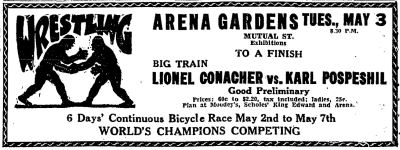
A debut.
Later that week on April 28, Mickailoff ran a card with a main event of World’s Heavyweight champ Henri DeGlane versus “The Utica Panther” Joe Malcewicz. A packed crowd saw DeGlane retain his laurels in a one hour and twenty minute bout said to be one of the most thrilling the city had ever seen. Conacher was introduced to the crowd and received a huge ovation. Karl Pospeshil, who would be Conacher’s opponent in his debut a week later, wrestled Tony Catalina and was said to have never looked more impressive. “Undoubtedly Pospeshil will make it more than interesting for Conacher when the latter makes his debut into professional wrestling,” read one report.
Leading up to his debut on the May 3 card, Conacher had the support of the local press who believed he had the strength and courage to master the sport. “In football, hockey, lacrosse, baseball, swimming, track and field, amateur wrestling and boxing, Conacher was successful far beyond expectations and there should be no deviation from this rule when he swings right merrily into professional grappling,” wrote one scribe.
Another item suggested that Conacher would spend the rest of his career in wrestling as he was delighted at the progress he had made in his training. Conacher himself stated that if he made good he would devote all his time to the sport and forget about lacrosse and hockey, realizing that there was a fortune to be made in the game.
Mickailoff too was high on his new charge, extremely pleased with the progress Conacher had made and confidence in matching him with the tough Pospeshil. Mickailoff called Conacher “big league” and was said to have shown Conacher “the tricks” to add to the amateur experience already gained.
Conacher had spent some time training with Ali Hassan, a regular in the city’s mat wars, who was also impressed with Conacher, especially the strength in his legs, and ability to use the leg scissors to advantage.
He would win his debut over Pospehil with two straight falls in under 13 minutes. Said to be nervous at first and slow to get in stride, Conacher felled his opponent with two flying tackles to take the first fall in 11:19. The final fall in less than two minutes. He would also use the leg scissors and other offensive and defensive wrestling maneuvers to outwork his foe. Mickailoff was delighted at the outcome, confident that the 197-pound Conacher would win but not in such a fast and decisive fashion against the larger Pospehil.
They brought in a solid 5,500 fans going up against the first lacrosse game of the season at Maple Leaf Gardens, which drew 4,000. The very popular Six Day Bike Race was also in progress (50,000 fans over six days) as well as the International Baseball League opener at Maple Leaf Stadium that drew 8,000. The write-ups stressed the fact that any of those events, including wrestling, would have drawn better if not going head to head.
His opponent, Pospehil, congratulated Conacher after the bout and went on to predict that he would be a colourful and sensational wrestler and worthy to tangle with the best of the sport.
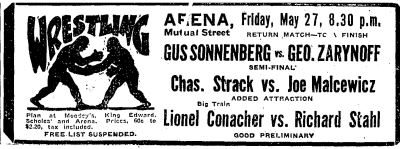
Returning to action.
A week later on May 9, Conacher wrestled his second bout, this time at the Mount Royal Arena in Montreal. He took on Young Hackenschmidt and won the bout with the flying tackle in a speedy six minutes.
He was scheduled to appear at the Quebec Arena two days later but had wired promoter Asselin that day to say he had a sprained shoulder. The Quebec Athletic Commission held an emergency meeting and suspended Conacher for a period of three months. That same day Conacher underwent a minor operation in Montreal for an arm infection from mat burns suffered while training for his debut and aggravated in that first bout. He was forced to cancel the Quebec bout and another set for Boston later that week. (Note that Stanley Stasiak, who was “The” wrestling star in Toronto at the time, had died months earlier in September 1931 from the same type of infection.)
Less than two weeks later, Conacher was recovered enough to be out golfing in Toronto alongside pal and partner Burch and was slated to play in an exhibition baseball game on May 24.
He would take on Richard Stahl in Toronto on May 27 underneath Gus Sonnenberg versus Count Zarynoff in the main event as well as the Malcewicz brothers, Joe and Frank. Another 5,000 fans saw Conacher win in just over 12 minutes and he was said to have shown remarkable knowledge of the game. The next day the Quebec commission lifted the suspension, satisfied that he had missed the show due to the arm infection and subsequent surgery.
Conacher would move on to Windsor, Ontario, on June 1, defeating Joe Bartello, and the next night in Brantford, he beat Nick Gorassini. At that time, Mickailoff was also running shows outside Toronto including Hamilton and Brantford. A little over a week later, back in Toronto, Conacher beat Texan Eddie Elzea and was a big crowd favourite with many of the opinion that he was ready for the semis. Mickailoff was pleased with the progress and happy to take his time with his new star, not moving him up the cards too fast.
The rising star finally made his way to Boston to wrestle for Bowser on June 15, facing Tony Catalino. He returned to Toronto undefeated and enjoying popularity in every city he appeared. On the day of the June 23 Toronto card, with Conacher to face Louis Loew, there was an item in the sports page that said he may be present — and playing — for the upcoming Maroons-Tecumseh lacrosse game at the Gardens. Brother Charlie, also a skilled lacrosse player, was rumoured to be the next to enter the lacrosse league as he had been present at previous games.
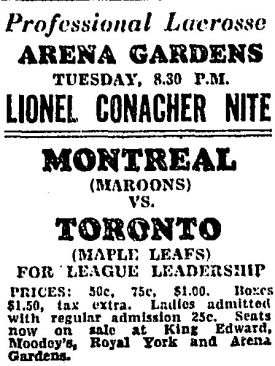
A special night for Lionel Conacher.
On July 5, Lionel was again suspended in Quebec for 30 days after missing a bout in Montreal the day previous. After stops in Niagara Falls and again in Boston (in front of 20,000 for a Deglane-Jack Washburn bout) he wrestled what appears to be his final bout, against Stahl in Toronto on August 4. Eight days later it was reported that he was abandoning his Buffalo bout that night and that he may be out of hockey for the next season due to the injured elbow. He had “notified his management to book no other matches for him for the time being.”
By October, Conacher was penciled in to be playing in the season opener for the NHL Maroons on November 12. He was back in action on opening day and didn’t miss a beat, assisting on the winning goal as the Maroons beat the Ottawa Senators.
Conacher’s in-ring days may have been done, but he was not done with pro wrestling. He would save the day by filling in for special ref Jack Dempsey at a wrestling card in Oshawa in late 1937. The fans wanted refunds until they realized Conacher was taking Dempsey’s spot. He also served as vice-chairman of the Ontario Athletic Commission. In 1938 he was the stakeholder for a $1,000 trust enforced for a Masked Marvel-Yvon Robert bout as a guarantee Marvel would unmask if he lost.
There is little doubt that Lionel Conacher could have had a more significant wrestling career, but the more mainstream sports drew him back.
